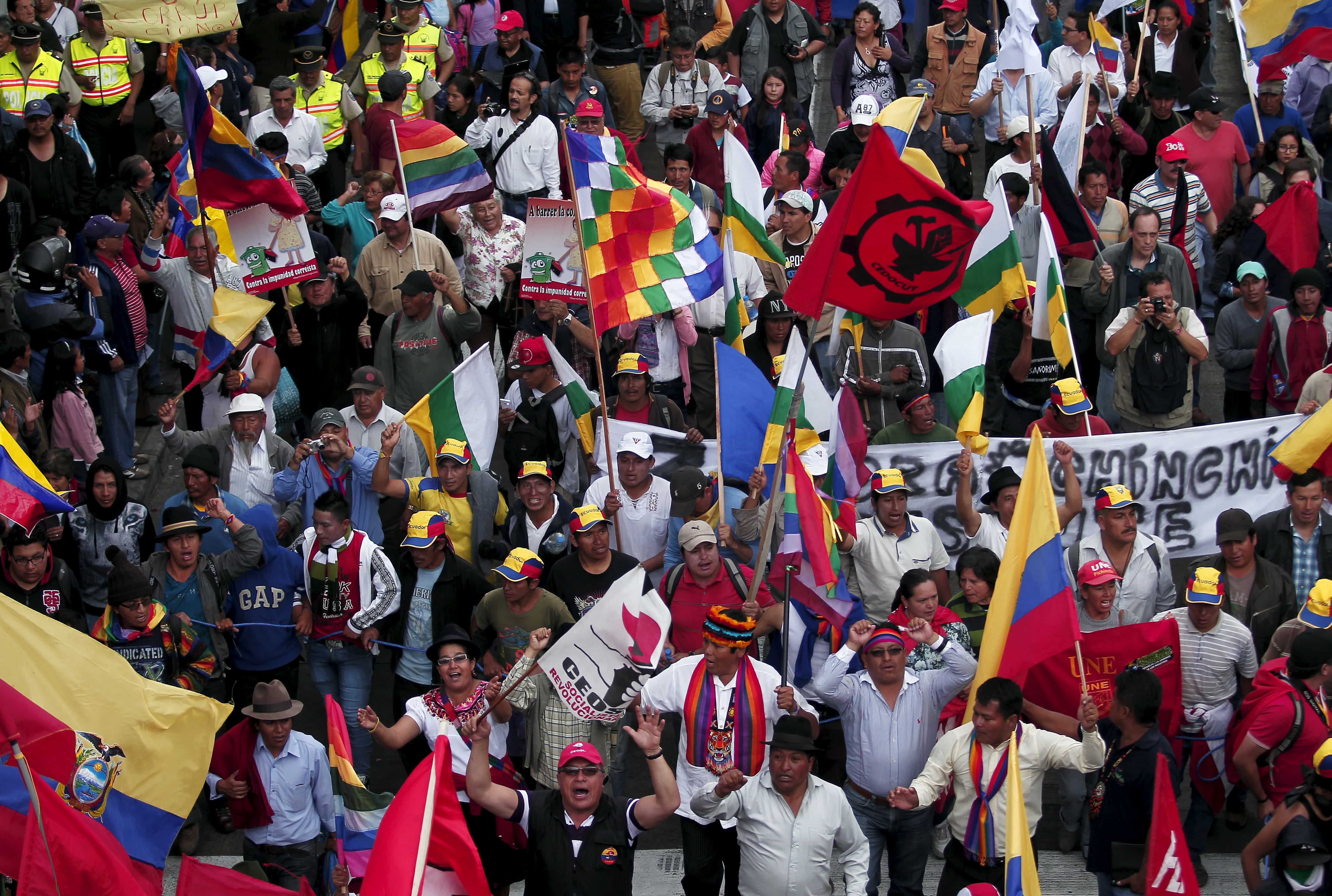“The government used the threat of a volcanic eruption near Quito to grant itself sweeping powers to deploy the military throughout the country and suspend fundamental rights,” said Daniel Wilkinson, Americas managing director at Human Rights Watch.
This statement was originally published on hrw.org on 10 November 2015.
Ecuadorian security forces used excessive force to disperse anti-government protests in August 2015, Human Rights Watch said today. The authorities appear to have made no serious effort to investigate officials who committed abuses. Instead, the government congratulated security forces for their performance, dismissed the protests as violent, and brought criminal charges against nonviolent protesters and bystanders.
In August, tens of thousands of Ecuadorians took to the streets in at least 10 provinces across the country to protest a wide range of issues, including the government’s environmental policies and efforts to remove presidential term limits. Dozens of witnesses reported that the protests were largely peaceful, with isolated clashes between security forces and some protesters, who threw rocks and Molotov cocktails. Authorities say that 116 police and military officers were injured in the clashes.
“All attacks against police and military officers should be investigated,” said Daniel Wilkinson, Americas managing director at Human Rights Watch. “But attacks by protesters or provocateurs are no excuse for security forces using brutal force against peaceful demonstrators and bystanders.”
In October, Human Rights Watch interviewed witnesses, victims, activists, and lawyers in Ecuador; watched videotaped interviews with additional victims and witnesses; and reviewed medical reports, video footage, and official documents, including judicial files.
Human Rights Watch identified credible evidence that police or military personnel used unnecessary and unlawful force against unarmed people in at least 50 cases. They beat and arbitrarily arrested dozens of people, and illegally entered the homes of people who were not participating in the protests.
In one case Human Rights Watch documented, Mario Farid Mosquera Zurita, a 26-year-old merchant, intervened to help a woman being beaten by police as he walked home past demonstrations in Quito’s historic center. He told prosecutors later that the police beat him with fists and batons, repeatedly kicked him, and forced him onto a police motorcycle, where an officer continued to beat him in the ribs. Human Rights Watch reviewed a medical report that documented his injuries. Mosquera was charged with “attack or resistance” against authorities, which carries a sentence of up to two years in prison, and sent to pretrial detention.
On September 3, an official news outlet reported that a total of 126 people had been detained in 10 provinces for allegedly committing crimes during the protests such as sabotage, paralyzing public services, and attacking security forces and public property.
On August 15, President Rafael Correa issued a presidential decree declaring a state of emergency throughout Ecuador due to volcanic activity near Quito. The decree deployed the Armed Forces, which under an Ecuadorian law can only participate in public security operations during states of emergencies. It authorized the Armed Forces and National Police to use “all means at their disposal” to address the emergency, and said that certain rights, including the requirement that authorities obtain a warrant before entering one’s home and the right to assembly, would be suspended to the extent necessary to address problems generated by the volcanic activity.
On August 17, military and police personnel used excessive force to disperse a largely peaceful anti-government protest by members of an indigenous community in Saraguro, Loja province, which is located more than 500 kilometers from the Cotopaxi volcano in Quito. Among those detained was Manuel Asunción Poma Poma, a local resident who said he was leaving a store close to where a demonstration was taking place when security forces attacked him with batons, knocking out five teeth and damaging his jaw. Human Rights Watch reviewed a medical report and photographs that documented his injuries.
“The government used the threat of a volcanic eruption near Quito to grant itself sweeping powers to deploy the military throughout the country and suspend fundamental rights,” Wilkinson said. “Then it sent soldiers and police officers to break up a largely peaceful protest more than 500 kilometers away, beat up and arrest members of an indigenous community, and raid their homes without warrant.”
Human Rights Watch, on October 13, submitted a request to the office of Attorney General Galo Chiriboga, seeking information about investigations into alleged attacks against security officers and alleged abuses by security officers. On October 27, the Attorney General’s Office provided Human Rights Watch with a chart that includes brief descriptions of and status updates on 130 cases opened against citizens in 10 provinces. Twenty-eight detainees remain in pretrial detention, the office said. The chart does not include any information on investigations against police or military officers accused of committing abuses during the August protests.
Instead of bringing members of the security forces responsible for unlawful attacks to justice, the government has consistently responded that protesters had been violent, implying that all violence by security forces was justified. In two of his weekly TV shows during August, Correa showed video of isolated clashes as though they pervaded the demonstrations, and congratulated Ecuadorian police and military officers for their “professionalism” during the protests.
International human rights standards – including the United Nations Basic Principles on the Use of Force and Firearms by Law Enforcement Officials – require security forces to exercise restraint, “in proportion to the seriousness of the offence and the legitimate objective to be achieved,” and to minimize “damage and injury.” States are required under international law to provide victims of abuse with effective remedies, including access to justice and reparations.
“Security forces committed serious abuses against protesters, and the government congratulated them,” Wilkinson said. “That sends the message that the government not only tolerates but encourages these abuses.”



